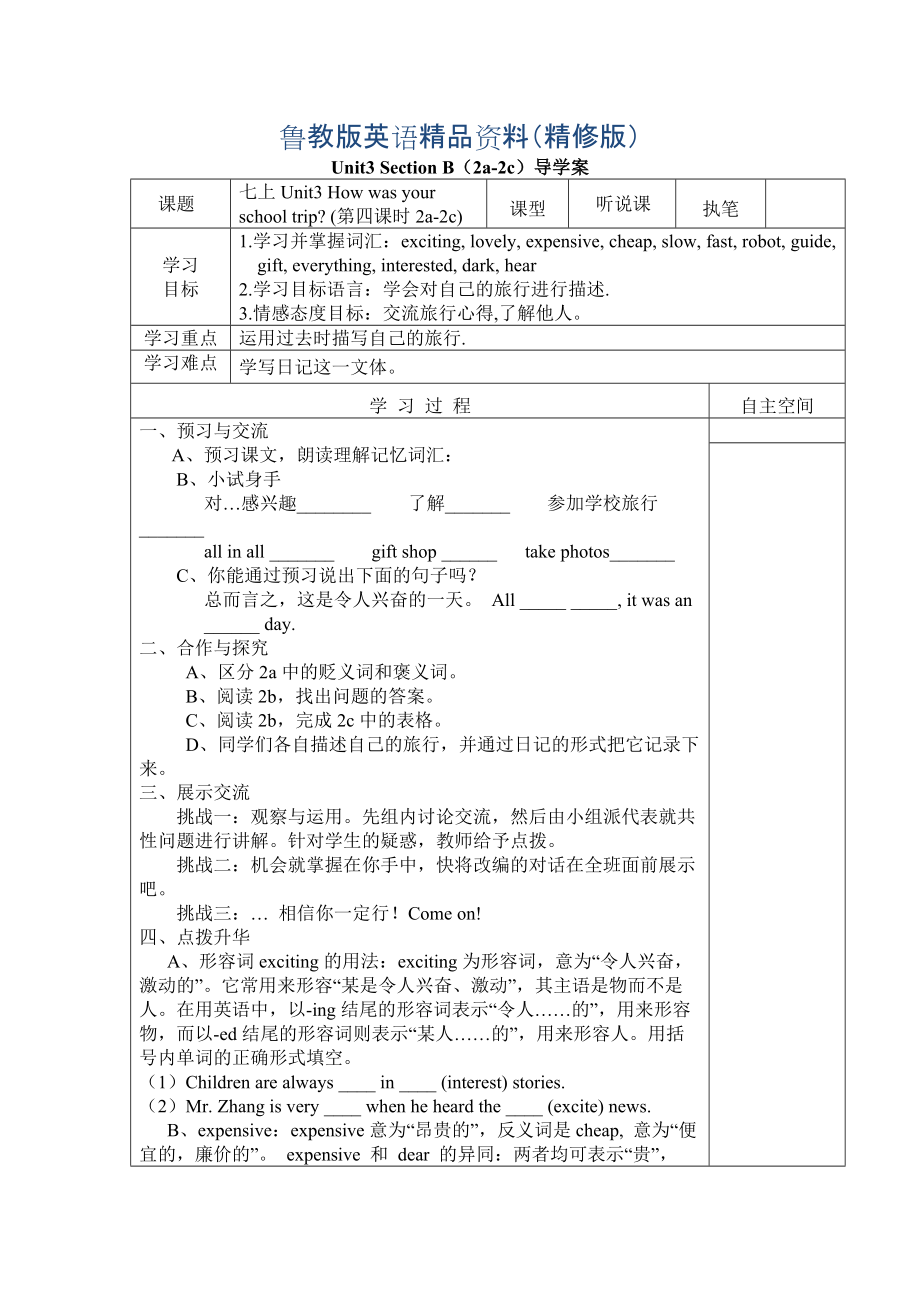《七年級英語魯教版上冊:Unit3HowwasyourschooltripSectionB2a2c導(dǎo)學(xué)案精修版》由會員分享�,可在線閱讀,更多相關(guān)《七年級英語魯教版上冊:Unit3HowwasyourschooltripSectionB2a2c導(dǎo)學(xué)案精修版(3頁珍藏版)》請在裝配圖網(wǎng)上搜索。
1���、魯教版英語精品資料(精修版)
Unit3 Section B(2a-2c)導(dǎo)學(xué)案
課題
七上Unit3 How was your school trip? (第四課時2a-2c)
課型
聽說課
執(zhí)筆
學(xué)習(xí)
目標(biāo)
1.學(xué)習(xí)并掌握詞匯:exciting, lovely, expensive, cheap, slow, fast, robot, guide, gift, everything, interested, dark, hear
2.學(xué)習(xí)目標(biāo)語言:學(xué)會對自己的旅行進行描述.
3.情感態(tài)度目標(biāo):交流旅行心得,了解他人����。
學(xué)習(xí)重點
運用過去時描寫自己的旅行.
學(xué)
2��、習(xí)難點
學(xué)寫日記這一文體���。
學(xué) 習(xí) 過 程
自主空間
一����、預(yù)習(xí)與交流
A����、預(yù)習(xí)課文,朗讀理解記憶詞匯:
B�����、小試身手
對…感興趣________ 了解_______ 參加學(xué)校旅行_______
all in all _______ gift shop ______ take photos_______
C��、你能通過預(yù)習(xí)說出下面的句子嗎�?
總而言之�,這是令人興奮的一天�����。 All _____ _____, it was an ______ day.
二��、合作與探究
A��、區(qū)分2a中的貶義
3���、詞和褒義詞。
B���、閱讀2b�,找出問題的答案����。
C、閱讀2b�����,完成2c中的表格����。
D����、同學(xué)們各自描述自己的旅行��,并通過日記的形式把它記錄下來���。
三���、展示交流
挑戰(zhàn)一:觀察與運用。先組內(nèi)討論交流�,然后由小組派代表就共性問題進行講解。針對學(xué)生的疑惑�,教師給予點撥。
挑戰(zhàn)二:機會就掌握在你手中���,快將改編的對話在全班面前展示吧��。
挑戰(zhàn)三:… 相信你一定行�!Come on!
四�����、點撥升華
A、形容詞exciting的用法:exciting為形容詞�����,意為“令人興奮����,激動的”��。它常用來形容“某是令人興奮�、激動”,其主語是物而不是人����。在用英
4、語中���,以-ing結(jié)尾的形容詞表示“令人……的”�����,用來形容物����,而以-ed結(jié)尾的形容詞則表示“某人……的”,用來形容人���。用括號內(nèi)單詞的正確形式填空����。
(1)Children are always ____ in ____ (interest) stories.
(2)Mr. Zhang is very ____ when he heard the ____ (excite) news.
B����、expensive:expensive意為“昂貴的”,反義詞是cheap, 意為“便宜的�,廉價的”。 expensive 和 dear 的異同:兩者均可表示“貴”�����, 但前者多指物美
5��、價高����,非購買者財力所能及:而后者多指物價超過常情。
試譯:她的衣服很貴�,但他的衣服很便宜。 Her clothes are ______ but his is ______ ______.
C�����、動詞hear 的用法:hear 是行為動詞,意為“聽到�����,聽說”�,表示“聽到”的結(jié)果�����,后跟名詞或代詞����,過去式為heard.常用短語有hear sb. do sth. (聽到某人做某事),hear sb. doing sth. (聽到某人正在做某事)�����,hear of (聽說)��,hear from (收到某人的來信)等��。它與listen同義�。但listen注重的僅僅是動作��,而不是結(jié)果�,后跟“聽
6�����、”的對象時��,需加介詞to.
用hear或 listen 及其短語填空�����。
(1)Does Lucy often _______ her sing?
(2)______ to me! Don’t look out of the window.
(3)______! Can you _______anything near here?
(4)I ______ from Helen yesterday. She ______ of I had a good English teacher.
五��、當(dāng)堂練習(xí)
Ⅰ.單項選擇�����。
( )1. We got ___
7���、___ when we heard the ______ news.
A. excited; exciting B. excited; excited C. exciting; excited ( )2. Jim is a very _____ person and we are ______ in his story.
A. interested; interesting B. interesting; interested
C. interested; interested
( )3. He ______ one of _
8���、_____friends at the station yesterday afternoon.
A. saw; him B. saw; his C. sees; his
( )4.—How was your school trip?
—Pretty good! We ______the history museum.
A. visit B. visited C. will visit
( )5.Pardon? I ______ hear you.
9、 A. don’t B. didn’t C. can’t
Ⅱ.用所給單詞的適當(dāng)形式填空����。 1. He ______ (be) at work yesterday morning.
2. Where did you ______ (spend) your holiday?
3. Tom ______ (do) some shopping with his mother last Saturday.
4. My mother often does so
10��、me ______ (cook) at home.
5. I didn’t watch TV last night, I ______ (see) movie with my friend.
Ⅲ.根據(jù)漢語意思完成句子�。
1.昨天那些學(xué)生參觀了一個消防站���。
Yesterday those students ______ a ______ ______.
2.孩子們對博物館里的機器人很感興趣�。
Children were ______ ______ the ______ at the ______.
3.向?qū)Ы塘宋覀內(nèi)绾巫兊门d奮起來���。
The guide ______ us ______ ______ be ______.
4.總而言之,這是令人興奮的一天�。
_______ _______ _______, it’s an _______ day.
5.Tom上周的旅行怎么樣?
______ ______ Tom’s ______ last week?
六��、課堂小結(jié)
1����、我的收獲:
2、我的困惑:
 七年級英語魯教版上冊:Unit3HowwasyourschooltripSectionB2a2c導(dǎo)學(xué)案精修版
七年級英語魯教版上冊:Unit3HowwasyourschooltripSectionB2a2c導(dǎo)學(xué)案精修版

